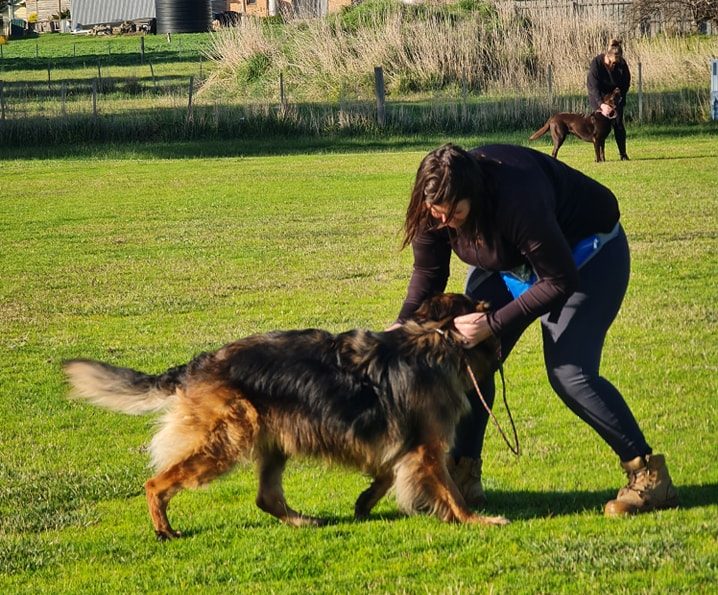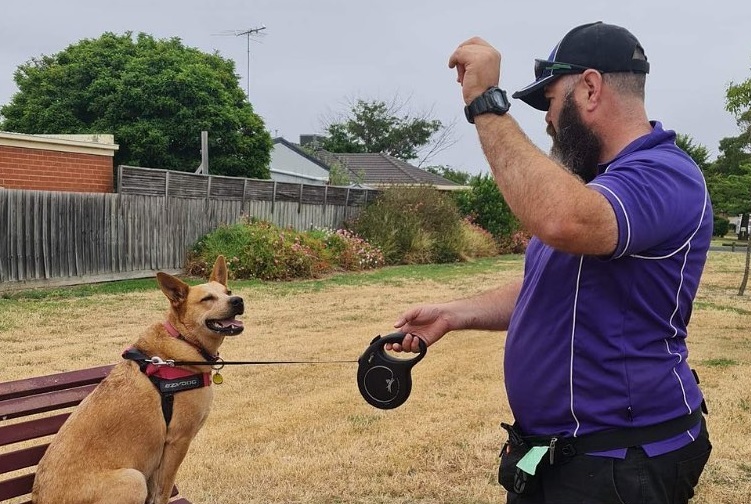
Blog

What is a Dog Behaviourist
March 4, 2024
In the world of our furry friends, understanding their behaviour is crucial for a happy relationship. Meet dog behaviourists – pros dedicated to figuring out why dogs act the way they do.
This blog explores their role, the basics of dog behaviour training, and why pet owners are turning to them.
Dog Behaviourist Defined
A dog behaviourist is a pro who specialises in understanding, evaluating, and changing a dog’s behaviour. Unlike regular trainers who focus on basic commands, behaviourists dig into the psychological side of dog behaviour. They look at things like past experiences, genetics, and surroundings to understand why a dog acts a certain way. By getting to the root causes, behaviourists can tailor solutions to fix specific issues.
What is Dog Behaviour Training?
Dog behaviour training is a way to change a dog’s behaviour systematically, involving both the dog and the owner. It uses various techniques to tackle problems like aggression, anxiety, and excessive barking. Behaviourists use positive reinforcement, rewards, and sometimes counter-conditioning to reshape undesirable behaviour and strengthen the bond between the dog and its owner.
Dog Behaviourist vs Dog Trainers
While people often use “behaviourist” and “trainer” interchangeably, they mean different things. Trainers focus on teaching commands and obedience, making sure a dog responds to specific cues. Think of dog trainers like teachers who help dogs learn commands and behave well. They cover the basics, like sitting, staying, etc.
Behaviourists, on the other hand, get into the reasons behind behaviour, dealing with emotions and psychology. They look deeper into why a dog acts a certain way. Instead of just teaching commands, they want to understand the reasons behind a dog’s behaviour. They explore emotions, past experiences, and even genes to figure out what’s going on.
Why are Dog Behaviourists Needed?
The demand for dog behaviourists is rising because pet owners now deal with more than just basic obedience. Many face issues like aggression, fear, or odd behaviours in their dogs. Behaviourists bring a deep understanding and special techniques to solve these problems. They create personalised solutions based on each dog’s personality and history, leading to more effective and lasting results.
When to Choose a Behaviourist: Beyond Basic Training
Both trainers and behaviourists are important, but behaviourists are super helpful when things get a bit tricky. If your dog is dealing with more complicated stuff, like being very aggressive, super scared, breaking things, or doing the same thing over and over, that’s where a behaviourist can really help. They know how to deal with the emotional side of things and can come up with solutions that fit your dog’s unique needs.
Are There Such a Thing as Untrainable Dogs?
The idea of dogs being “trainable” is a myth. Most behavioural issues can be fixed with the right approach and commitment. While some dogs might present unique challenges, most can benefit from behaviour training. A good behaviourist can adjust techniques to fit a dog’s needs, proving that with patience and consistency, even tough problems can be overcome.

What Dog Traits Signal the Need for Behaviour Training
Certain dog behaviours act like signals telling us that something might not be quite right. Catching these signs early is like putting the brakes on problems before they get worse. Here are some things to keep an eye out for:
1. Aggression – When Your Dog Gets Really Mean
If your dog starts acting mean towards people, other animals, or even objects, it’s a big red flag. Aggressive behaviour can make things tough for everyone and needs attention.
2. Excessive Fear – When Your Dog is Always Super Scared
Does your dog seem scared all the time, even in normal situations? If everyday stuff makes them super nervous, a behaviourist can step in to help them feel more at ease.
3. Destructive Behaviour – When Your Dog Loves to Chew or Dig A Lot
Some dogs really enjoy chewing or digging, but if it becomes a bit much, a behaviourist can figure out the “why” behind the behaviour. Understanding why they do it helps to find a better balance.
4. Compulsive Habits – When Your Dog Does the Same Thing Over and Over
If your dog has habits like licking, chasing their tail, or pacing that they just can’t seem to stop, it might be time to call in a behaviourist. They’re like detectives, figuring out why these habits stick around.
5. Excessive Barking – When Your Dog Can’t Stop Barking
While barking is normal, excessive barking, especially without an apparent reason, could be a sign of underlying issues. A behaviourist can help understand and address this behaviour.
6. Isolation – When Your Dog Prefers Being Alone All the Time
Dogs are social animals, so if your furry friend suddenly wants to be alone all the time, it might signal a problem. A behaviourist can explore if something is bothering them.
Overreacting to Sounds or Movements: When Your Dog is Always on Edge
If your dog seems jumpy and overreacts to sounds or movements, it could indicate anxiety. A behaviourist can help identify triggers and ease their nervousness.
7. Excessive Licking or Scratching – When Your Dog Can’t Stop Grooming
While grooming is normal, excessive licking or scratching might signal discomfort or stress. A behaviourist can figure out the root cause and provide solutions.

The Importance of Early Intervention
Getting help early on is like putting out a small fire before it turns into a big one. If you notice any of these behaviours, don’t wait. Bringing in a behaviourist can make a big difference. They’ll work with you to understand your dog better and help create a happier world for them.
Remember, dogs can’t tell us what’s wrong in words, so they show us with their behaviour. Being a good dog owner means keeping an eye out for these signs and getting the right help when needed.
Finding a Good Dog Behaviour Training Service
Choosing the right dog behaviour training service is crucial for success. Look at the behaviourist’s experience, training methods, and client reviews. For instance, Jim’s Pet Patrol Dog Behavior Training stands out for its proven track record, positive methods, and personalised approach. Remember to research and pick a behaviourist that aligns with your values and your dog’s needs.
In Conclusion
Dog behaviourists do more than traditional trainers. They act like detectives, figuring out why a dog behaves a certain way and implementing strategies for improvement. Understanding the importance of behaviour training, recognising signs that need professional help, and choosing the right service can lead to a happy relationship between dogs and owners.
Enjoy the journey of decoding your dog’s behaviour, and watch the positive changes a skilled behaviourist can bring to your furry friend’s life. For reliable pet care you can count on call Jim’s Pet Patrol today!
Recent Posts
- How To Care for Newborn Kittens March 25, 2024
- What is a Cat Sitter – A Beginner’s Guide March 18, 2024
- Top Anxious Dog Behaviour and How To Address Them March 11, 2024
- What is a Dog Behaviourist March 4, 2024
- How To Pick The Right Dog Daycare for Your Pet February 26, 2024